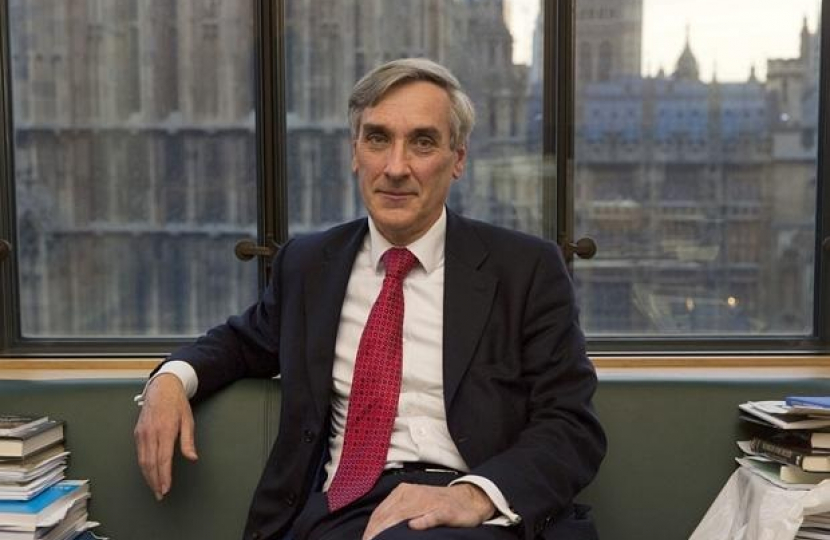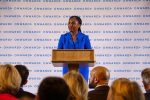
As I listen to people on doorsteps and read the views that come into my website there is no passion for Keir Starmer or for Labour policies. Indeed, the voters who say to the pollsters they do not want to vote Conservative who did vote for us in 2019 often want us to be more Conservative, not less. They are not clamouring for Labour's higher taxes. They do not want intensified and speeded up bans on petrol and diesel cars, or mandatory heat pumps. They do not like Labour and Lib Dem Councils that make it more and more difficult for anyone to get to work by van or car, or get to the shops and park easily. They are not asking for an attack on private schools, driving more people to compete for places at the better state schools. They do not want a larger bureaucracy in the public sector. They are not preoccupied by the culture wars that consume the political left. They do dislike the highly regulated and in part nationalised energy, water and railway industries and want someone to sort them out to provide better and cheaper service. They want cleaner rivers, no water rationing, more reliable and affordable trains, and reliable electricity at sensible prices. They are more concerned about outcomes than how it is done.
There is an eerie disengagement, an ennui about all the main political parties. As the tax squeeze intensifies on working people Conservatives have fallen in the polls, but there is no enthusiastic rush to the parties of the left that want to make the tax squeeze worse. There is an understanding on the economy that covid, lockdowns, the Ukraine war and the energy price spikes were external events that hit all advanced economies. The disappointing economic results are not the same as the political impact of the exchange rate mechanism recession during the last period of Conservative government or the Great recession brought on by the banking crash at the end of the last Labour government. Those were avoidable errors of UK policy that marked the end for each of the two main parties in office in turn when they occurred. It means the present government has an opportunity to win people back, if it understands the sources of their current displeasure.
The main thing to get right is the economy. The Prime Minister recognises this with his twin aims of getting inflation down and getting growth up. The problem is he seems to accept the wrong Treasury advice that you have to get inflation down first by stopping growth, and then only after that can you try to warm the economy up again to produce some growth and start to make people better off. That is bad economics and even worse politics. There is not time enough to bring inflation right down with no growth or even a shallow recession, and then to pick things up again in ways that people will feel and appreciate.
Fortunately growth and lower inflation are not enemies. The secret to both is to put more UK capacity in, so more is made and grown at home. This creates more jobs and incomes at home, and provides more supply to lower price rises.
This is why the Treasury are so wrong. We need a lower business tax rate, not a 31% hike in Corporation Tax. We need to copy the Republic of Ireland with their 12.5% Corporation tax rate. As a result they have far more investment per head, higher GDP per head, and more business tax revenue per head than we do. We need to drive hard for energy self sufficiency to cut our dependence on unreliable and very expensive imported energy, the source of much of last year's inflation. To bring that off we need to end the price controls, the subsidies and the windfall taxes. If we added substantially to our gas and oil output to replace imports we could get a big boost to tax revenues without windfall taxes stopping the investments. That could happen quickly. If we got on with producing small modular nuclear plants and with ways of storing renewable energy to smooth out its delivery again we would boost growth and provide some downward pressure on prices in due course when they started generating.
In order to grow the economy faster we need to be far more supportive of the self employed and small business. Instead of shrinking the army of the self employed as covid lockdowns and the new fiercer IR 35 tax arrangements have done, we need to expand the numbers again. Return the tax system to the rules of 2017 when self employment was growing well. Raise the VAT threshold for small business from £85,000 to £250,000. That would give an immediate boost to small business output across many sectors where entrepreneurs limit their turnover to avoid the need to register.
The water industry should be required to put in more clean water capacity. We cannot keep on adding so any additional people to our population without providing more basic services like water. People do not want to be lectured on using less, and told there is a hosepipe ban as soon as it gets warm and dry for a few weeks. The government is seeking an investment explosion to handle more dirty water to avoid sewage discharges into rivers. The pricing formula and tax regime has to make this feasible at a lively pace.
The railway industry is busy running near empty trains on much of the network at various times of day when it is not on strike. Railway investment is grossly inflated and distorted by the very expensive and much delayed HS2 project, which will not bring us any revenue or benefit for most of this decade. What is needed is a refocus and new timetable for this investment to make room for more worthwhile immediate projects to boost capacity on busy routes and to provide an attractive offer for the modern work commuter who may only wish to go the place of work two or three days a week. Digital signalling with on board train systems to allow safe closer running to other trains on existing tracks could boost capacity at a fraction of the cost of a new railway line. It should be possible to run a lot more trains at busy times on existing track more safely with the complete visibility of the tracks and other train locations to modern digital integrated systems.
We need to switch the system of farming subsidies away from wilding to supporting more domestic production of eggs and apples, tomatoes and meat. We lost a lot of market share during our years in the common agricultural policy and need to catch up. People would like more local food with fewer food miles.
The public would warm to a government that went for growth and showed how the UK is now free to make and grow so much more for ourselves. Our EU years were dogged by huge balance of trade deficits with the continent as we lost market share in everything from chemicals to fruit and from steel to energy. Reversing this would be good for jobs, would help lower inflation, would generate more tax revenue not less. It does need lower tax rates, less lecturing of the consumers and more working with business to deliver the capacity we need. It needs revision to regulations like the emissions trading scheme and carbon tax, which penalises domestic producers and favours imports. In the second world war the country was told to dig for victory, putting more land to work to grow food. Then we needed to make our own ships, tanks and planes to feed the war machine. It all worked very well and great feats were achieved. Today we need to make more of the cars, the household goods and the food we want for a decent life. That will make the country more prosperous and would shift the opinion polls.

